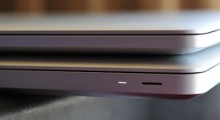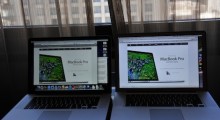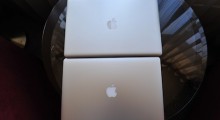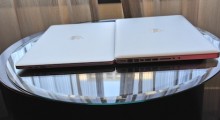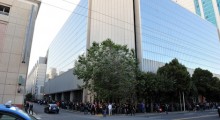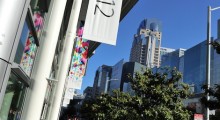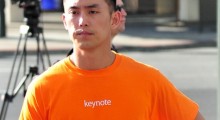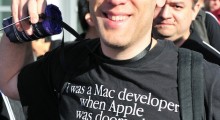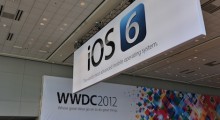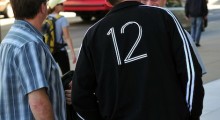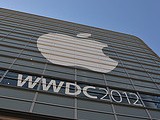June 13, 2012
Written by Peter Cohen
Jonathan Stempel for Reuters:
Apple Inc must defend against a lawsuit accusing it of letting advertisers secretly track the activity of millions of mobile device users, a federal judge ruled, but Google Inc and several other defendants were dismissed from the case.
The suit alleges that Apple designed devices like the iPhone to collect data from users when apps were downloaded, without permission.
Several other companies including AdMarval, Admob, Flurry and Medialets were dismissed from the case.
Written by Peter Cohen
Clint Boulton for the CIO Journal blog on the Wall Street Journal:
But it may also wreak havoc on CIOs’ networks and connectivity budgets — better quality displays require more network bandwidth, which allows users to increase data consumption. Consider that experts told CIO Journal earlier this year that the new iPad, which includes a Retina display of 2048-by-1536 resolution with 3.1 million pixels, would slow enterprise networks to a crawl and increase data costs from carriers. Now imagine how a Macbook with 5.1 million pixels — two million more than the new iPad — will increase data traffic in office networks.
Normally I’m inclined to ferret this stuff away for my Angry Mac Bastards podcast, but this one was so astonishing I had to post it here.
The so-called “experts” – and Boulton – are wrong. Dead wrong. The resolution of the new MacBook Pro’s display doesn’t change the resolution of source content transmitted over the network one bit.
Putting it another way: Does having three monitors on your desk make you consume massively more bandwidth than having just one? Of course not. It just lets you see more stuff on your screen.
Dumb. Just dumb.
Update: Later on Wednesday Boulton posted a correction to his article to suggest that Retina Display-equipped device owners would consume more HD video, which would result in higher bandwidth consumption. It’s still a stretch, and it’s still a dumb article.
Game Center is coming to Mountain Lion when it debuts next month (you can get a bit more info on Apple’s “What’s New” Web page). This is a really big deal for gamers, because for the first time in Apple’s history, the company is providing its users with a social networking framework for games.
This vacuum has long been filled by a patchwork of third-party services. GameRanger is a practical example – a game finding and chat service that predates Mac OS X, and is still going strong (thanks at least in part to its expansion into the much bigger PC gaming market). Valve’s Steam service offers much of this functionality. Blizzard has its Battle.net service, which has become increasingly important to the company not just for game finding, ladders and rankings, but also for digital distribution and Digital Rights Management (DRM) technology. There are many others as well.
Now Mountain Lion is taking a page from iOS with Game Center, Apple’s own framework for social networking in games – game ladders and rankings, achievement tracking, friend finding, and game matching. What’s more, the software provides cross-platform functionality – so if you’re an iOS user with an existing Game Center account, you’ll be able to continue on with your Mac. But more than that, you’ll be able to challenge iOS gamers from your Mac, as well.
This means that Game Center on the Mac won’t be starting from square one, as Game Center for iOS did. Mountain Lion users are going to be gaining access to an already populated ecosystem. And hopefully it’ll give game developers who already have a leg up on iOS an added incentive to bring more of their titles to the Mac. We’ve already seen that trend, especially with Apple’s introduction of the Mac App Store – I anticipate it will be bolstered with Game Center’s availability on the Mac platform as well.
I don’t expect that Game Center is a death knell for any of the existing Mac game matching services. For one thing, Game Center is relegated to Mountain Lion. So it’s hands off for the many Mac users that can’t or won’t upgrade to the new OS when it debuts in July. That also means it’s fundamentally useless for legacy games, which many Mac users still play – games that either can’t be refit with the new technology or whose developers and publishers don’t really have an incentive to make Mountain Lion ready.
Of course, some companies have a vested interest in supporting their own systems (like Valve’s Steam service and Blizzard’s Battle.net). So they may be slow to update their games with support for Game Center, if they add it at all.
Ultimately, I don’t think Mac users will ever achieve parity with their PC gamer counterparts in terms of quantity of games, prices or release dates. Avid gaming enthusiasts are probably always going to be lured to the Windows platform because of Microsoft’s long-standing support for game technology and the enormous ecosystem of PC-centric developers and publishers.
But that matters less and less with each passing month. In ways big and small, Apple is gradually developing ways of its own to make Mac gaming a more user-friendly, fun experience. Game Center is the latest example, and it’s one I’m really looking forward to using when Mountain Lion debuts.
Written by Peter Cohen
Laura Hazard Owen for paidContent:
On Monday, I reported that the U.S. State Department was signing a $16.5 million agreement with Amazon to provide Kindles, content and service for overseas English language programs. Yesterday I was able to get on the phone with State spokesman Philippe Reines, who explained more about how the program will work and clarified some things that aren’t included in the available public documents. Some questions remain unanswered, and I’ve listed those at the end of this post.
Some have wondered why the State Department is considering Amazon Kindles for this project instead of Apple iPads. The answer actually goes back to Monday, when the State Department explained that the iPad’s “additional features are not only unnecessary, but also present unacceptable security and usability risks for the government’s needs in this particular project. Critically, the Apple iPad falls short on two requirements: the centrally managed platform for registration and content delivery, and battery life.”
Like it or lump it, there’s little question that Klout is the standard many employ for measuring social media influence. The new Klout for iPhone version 1.5, which debuts today, adds some significant functionality for avid users of the service – features that have been added as a direct result of the feedback the company has received since the first version debuted in April.
Changes include the addition of “Swipe to +K,” which lets you endorse other users’ influence by swiping your finger across one of their Topics, the same way you unlock your phone. A new Search function has been added that lets you enter any Twitter handle to find out that user’s Klout score. And a “Logout” button has been added to make it easier to switch between multiple Klout profiles, so if you’re using the app to track personal and professional identities, you’ll have an easier time of it.
Klout’s Stephen Hood says in a blog post that more is on the way, including the ability to connect other social networks to your Klout profile using your iPhone.
Written by Peter Cohen
Philip Elmer-DeWitt for Fortune:
But in the walk-up to this week’s World Wide Developers Conference, everybody — including the Journal — got scooped by an 18-year-old kid named Mark Gurman who goes to high school in Los Angeles and writes on the side for Seth Weintraub’s 9to5Mac.
Elmer-DeWitt recounts Gurman’s recent track record on WWDC rumors and comes away impressed: the kid got seven of eight rumors right.
Reminds me of another high schooler who made his bones in the Mac press by getting inside Apple in a way that almost no one else could at the time: Nicholas Ciarelli, a.k.a. Nick dePlume, the editor in chief of “Think Secret,” an Apple rumor site that he started when he was 13. Think Secret rose to such prominence that Apple filed a lawsuit against the site; ultimately it was shut down after Ciarelli and Apple reached a settlement.
Written by Shawn King
For the first time, The Beard got in on the WWDC party action by putting on his own bash. And what a bash it was. Imagine several hundred developers, open bar, live band…AND KARAOKE! Yes, it was just as much fun as you imagine. Not only that, but those of us lucky enough to attend got to hear The Beard rip up the stage playing his favorite killer guitars riffs. And let us be the first to tell you – he was awesome! 
The pictures don’t do the event justice but hopefully, they’ll give you a taste of what you missed and you’ll join us next year!
June 12, 2012
Apple on Tuesday confirmed for The Loop that an email posted to the Mac Rumors forums was in fact from company CEO Tim Cook.
Cook responded to a customer’s concerns about the Mac Pro and emailed him directly. The email was then posted to the Web site’s forums.
“Although we didn’t have a chance to talk about a new Mac Pro at today’s event, don’t worry as we’re working on something really great for later next year,” said Cook in the email. He also pointed out that the current Mac Pro model was updated yesterday.
Written by Peter Cohen
Eric Slivka for MacRumors:
Update: Apple PR has reached out and clarified that only the Mac Pro is expected to be next updated in 2013. The company had no comment about the iMac, which perhaps means that the iMac could see updates earlier than next year. It has been 406 days since the iMac last received an update, significantly longer than the traditional iMac update interval.
It’s pretty uncustomary for Apple PR to have to clarify the message this much, but kudos to MacRumors and others (David Pogue, Forbes) for putting together the pieces.
Bottom line is that the Mac Pro seems destined for a major facelift in 2013. As to the iMac, Apple is staying mum. For my money, I suspect that a refresh to the iMac will happen much sooner. An Ivy Bridge update to the iMac seems obvious and inevitable. The question is, what form factors will the iMac be available in? And will it sport a Retina Display, or at least have one as an option or as a specific model?
Apple bravely gave The Loop’s Jim Dalrymple a next generation MacBook Pro. I grabbed a few quick shots of it in his hotel room when he wasn’t looking.
Written by Peter Cohen
Killian Bell for Cult of Mac:
If you haven’t already installed the Messages application on your Mac, you will now have to wait until OS X Mountain Lion is released next month to get your hands on it. The Messages for Mac beta, which was released back in February after Apple’s initial Mountain Lion preview, has now been pulled by the Cupertino company.
It seems like a reasonable thing to do under the circumstances. Mountain Lion is only a month away from release, so if you’re not using Messages yet, you’re going to need to be just a tiny bit patient before you do.
Written by Peter Cohen
David Pogue for the New York Times:
Many Apple observers also wonder if Apple thinks that desktop computers are dead, since not a word was said about the iMac and Mac Pro. An executive did assure me, however, that new models and new designs are under way, probably for release in 2013.
Some users were frustrated by Monday’s announcement and the absence of changes to the iMac and the anemic bump given to the Mac Pro. If Pogue’s intel is good, it sounds like it’s just going to be a matter of patience.
Apple understands keenly that its mobile users are driving its business, however. This is not a new trend. And that’s why you’re seeing so much emphasis on the MacBook Air and MacBook Pro this week.
June 11, 2012
I met with Apple after its WWDC keynote today to get one of the new Retina display MacBook Pro notebooks. I thought I’d give a quick rundown on some of the features and my thoughts before posting a more in-depth review.
Obviously the first thing you’ll notice about this notebook is the display. It’s absolutely gorgeous. What’s interesting is that the display preferences are all about its Retina capabilities.
For instance, my MacBook Air lists the resolution available for my display as numbers like 1440 x 900, 1280 x 800 etc. On the Retina MacBook, the preferences show Best (Retina) and scales up to More Space, or down to Larger Text. Choosing one of the five options automatically adjusts the resolution of the display for you.
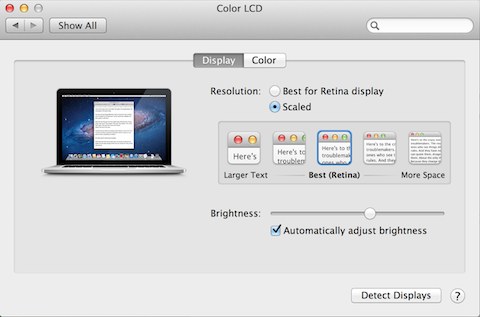
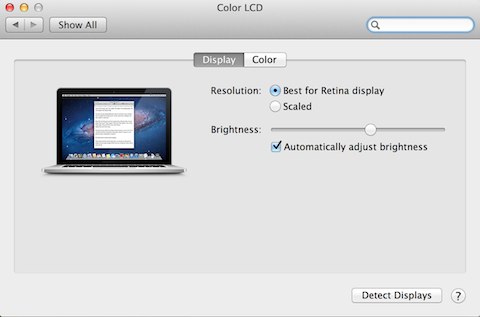
Although the resolution changes, it never shows you what resolution the computer is running in. Like most of Apple’s software and hardware, this way of choosing a resolution will probably appeal to a lot more people because it’s not just numbers, but a visual choice.
I found the best choice for me was the default setting “Best for Retina display.” That’s probably where I’ll leave it for now.
I tried to get the MacBook Pro to get hot enough to turn the fans on, but after a few hours of using it, the fans have still not turned on. Or if they have, I haven’t been able to hear them.
I’ve been doing regular work on the Retina MacBook so far like image editing, writing, email and browsing the Web. I used it on the desk and on my lap and there is no heat coming from the notebook at all. It seems to be a lot like the MacBook Air in that respect.
The only thing that surprised me at first was the weight. I thought it was heavy, but that’s because I was using a 13-inch MacBook Air for months. After working with it for a little bit the weight wasn’t as noticeable — it’s just what you get used to.
My Retina MacBook Pro has 8GB, 2.3GHz Intel Core i7 and a 250GB Flash disk.
I still have a lot of things to do with MacBook Pro, but I’m really happy with it so far.
Apple just announced the winners of this year’s ADAs at Moscone West. The winners are as follows:
iPhone Winners
Where’s My Water Company: Disney
Jetpack Joyride Company: Halfbrick Studios
National Parks by National Geographic Company: National Geographic Society / Rally Interactive
iPad Winners
Paper by Fifty Three Company: FiftyThree Inc
Bobo Explores Light Company: GameCollage
DM1 – The Drum Machine Company: Fingerlab
Student Winners
DaWindci (iPad) Company: Reality Twist GmbH, Mimimi Productions, Mediadesign Highschool of Applied Sciences
Little Star (iPad) Company: BiBoBox Studio, Dalian Nationalities University
Mac Winners
Deus Ex: Human Revolution Ultimate Edition Company: Feral Interactive Ltd
Limbo Company: Playdead ApS
Sketch Company: Bohemian Coding
Update: Where’s My Water was the winner for the iPhone. That has been corrected.
One sad footnote following today’s WWDC keynote: it appears that Apple has put an end to the 17-inch MacBook Pro, at least for now. The unit is no longer in Apple’s tech specs product matrix.
Up until yesterday, Apple still listed the 17-inch MacBook Pro as an option – the $2,499 machine came equipped with a 2.4 GHz quad-core i7 microprocessor, 750 GB hard disk drive, and AMD Radeon HD 6770M GPU. The system may still be available through some third-party Mac resellers, and is still listed among the refurbished units available sold via Apple’s online store.
Billed by Apple as “the ultimate mobile studio,” the system came equipped with a 1920 x 1200 pixel display. And that, right there, is probably why Apple chose to put an end to the massive mobile workstation.
Because on Monday, Apple also introduced the Retina Display-equipped 15.4-inch MacBook Pro. That newly-tooled machine sports an astonishing 2880 x 1800 pixel display – the highest resolution of any laptop available today, and higher even than Apple’s 27-inch Thunderbolt Display.
While there might be some benefit to the larger form factor of the 17-inch, it does seem increasingly anachronistic to have such a massive laptop when its primary benefit – higher resolution – has been usurped by a slimmer, smaller model that is mostly its better, for less money to start. A Retina Display-equipped MacBook Pro with comparable storage and better graphics is only $300 more than a 17-inch MacBook Pro would be.
I admit to a special fondness for the 17-inch model. I hopped on board that bandwagon years ago, when Apple introduced the 17-inch PowerBook G4, and stuck with that size after Apple made the Intel switch with the MacBook Pro. It was huge, heavy and unwieldy – I rarely walked away from a week-long sojourn at a trade show without welts on my shoulders from lugging the thing around in my backpack – but it was comfortable to use, in the same way that a vintage Cadillac is a comfortable ride.
I only gave up the 17-inch years later when a hardening economy and my own emptier pockets forced me to downsize. Now I’ve gone to the other end of the spectrum – I’m writing this article on an 11-inch MacBook Air. It’s certainly not as big and comfy as my old 17-inch MacBook Pro, but I don’t miss the welts.
At the WWDC keynote this morning, it was noted that Apple is introducing new Thunderbolt adapters, including one for Gigabit Ethernet – important for buyers of the MacBook Air and new Retina Display-equipped MacBook Pro, both of which have Thunderbolt, neither of which have on-board Ethernet.
So it’s no surprise that this afternoon Apple offered a software update for Thunderbolt-equipped Macs to support the new adapters, which go on sale for $29. The 1.2 release of the software is available for download on eligible Macs using the Software Update system preference.
(Hat tip: The Mac Observer)
By now you’ve probably read our live coverage of the WWDC keynote and caught up on the announcements, which included iOS 6, Mountain Lion’s ship date, and new MacBook Airs, MacBook Pros and the new MacBook Pro with Retina Display.
But there’s nothing quite like watching one of these events unfold yourself. If you couldn’t been at WWDC today, now you can watch the event on Apple’s Web site – you just need QuickTime installed. Enjoy!
Apple has revamped its AirPort Express with a new case design and new features that mimic what can be found on its larger cousins, the AirPort Extreme Base Station and Time Capsule. The device is still $99.
The new AirPort Express looks radically different from the previous generation, which seemed to sport a case design stolen from one of Apple’s laptop AC adapters. Now it looks like a proper Apple networking peripheral: the squared device with rounded corners looks like a wee AirPort Extreme Base Station, with a proper backplane that includes WAN and LAN Ethernet connections, a USB port to connect a printer, power jack and audio output port – so it can still serve as a simple wireless audio connection to use to stream audio from your Mac or iOS device to a nearby stereo.
But under the hood is where the biggest enhancement lays – the AirPort Express now sports dual-band 802.11n wireless networking, which means that 5 GHz devices can connect at higher speeds.
Although not discussed during the WWDC keynote and not mentioned in Apple’s published press materials for the show, the venerable Mac Pro got a minor refresh on Monday. A 12-core configuration is now standard.
The Mac Pro’s standard configuration now includes two 2.4 GHz 6-core Intel Xeon E5645 processors, replacing the quad-core E5620 processors it had previously. Speed hasn’t increased, and they still sport 12MB of L3 cache per processor. The quad-core configuration now features a 3.2 GHz Intel Xeon W3565 processor, replacing the W3530 processor in the previous configuration.
Connections remain identical – four FireWire 800 ports, five USB 2.0 ports, front panel headphone minijack and internal speaker, optical digital audio input and output TOSLINK ports, analog stereo line-level input and output minijacks, and multichannel audio support through Mini DisplayPort.
Graphics on the refreshed Mac Pro are the same – ATI Radeon HD 5770 or 5870 cards are standard issue. Memory is a bit faster on the dual processor system – 1333 MHz DDR3 instead of 1066 MHz DDR 3.
Here are some pics from the first couple of days. More can be found at my Flickr WWDC Set.
Two hundred must be a magic number for Apple engineers and executives – it’s the number of new features to be found in OS X Mountain Lion, due in July, and it’s also the number of enhancements Apple has announced for iOS 6, which was unveiled today at the WWDC keynote address.
iOS 6 will come this fall, supporting iPhone 3GS or higher, 2nd-generation iPads and newer, and the fourth-generation iPod touch.
Siri improvements are a centerpiece of iOS 6 changes. Siri now knows about sports, has more information about restaurants thanks to Apple’s partnership with Yelp and OpenTable, has more information about movies thanks to integration with the Rotten Tomatoes Web site, and can now launch Apps.
A new feature called Eyes Free is a joint effort with car makers including BMW, GM, Mercedes, Jaguar, Audi, Toyota, Chrysler and Honda, to integrate Siri support. So when you’re in your car you can use hands free systems to communicate with Siri, to keep your eyes on the road and your hands on the wheel. All the car makers are promising support for Eyes Free in the next year.
English and French support for Siri is coming to Canada, along with support for Spain, Mexico, Italy, Switzerland, and Korea.
Siri will also be supported on the new iPad with iOS 6 – an omission many customers were uphappy about when the new iPad was introduced. Older iPad owners (original iPad, iPad 2) are out of luck.
Facebook is now integrated into iOS 6, similarly to Twitter. You sign in once and use those credentials whenever you post. You can post pictures from Photos, info from Safari, location data and so on. It’s a public API, so other iOS apps will be able to use it. Brace yourself for a lot more Facebook chatter from iOS friends in the coming months.
Facebook support has also been integrated with the App Store. Tim Cook wasn’t lying at AllThingsD when he said that Apple was looking for new ways to integrate social networking.
Another new feature lets you control how you respond to incoming calls. You can be reminded later or send a text message back – better for circumstances where you can’t take a call at that time.
There’s also a new “Do Not Disturb” feature that mutes push notifications and keeps the screen dark. You can screen calls or even set the phone to prompt you if someone calls repeatedly.
Facetime works over cellular data in iOS 6 – presently it’s relegated to Wi-Fi. Facetime also unifies phone number and Apple ID – you can answer calls on your iPhone, iPad or Mac.
Maps have been completely redone iOS 6, replacing the Google Maps-driven feature in previous iOS releases. The map cartography has been made by Apple. It includes 100 million business listings around the world, real-time traffic data, turn-by-turn navigation (finally), and if you hit slow traffic, it’ll try to reroute you. The new Maps app is integrated with Siri, so you can ask questions en route without getting distracted by tapping the phone. A 3D view shows you vector renderings of buildings and other structures along the way, but one standout feature is called “Flyover.” Flyover shows you detailed renderings of terrain and structures, almost photographic-quality.
Other new features include enhancements to Game Center, support for “Made for iPhone” hearing aids, personal and work e-mail signatures, and a “Lost Mode” – you can send a phone number to your misplaced iOS device; if anyone picks it up and taps the screen, the phone will call that number.
Apple on Monday announced plans to ship the next version of OS X, “Mountain Lion,” in July for $20. It’s also going to be available as a free update for Apple’s newly-shipping MacBook Air and MacBook Pro laptops.
Many features of Mountain Lion have been previously announced – 200 new features are coming to the next release of OS X. Apple used this morning’s WWDC keynote address to developers in San Francisco to highlight several of the new features.
iCloud, Apple’s cloud services replacement for its subscription-based “MobileMe” service, now has 125 million users. iCloud is being integrated directly into Mountain Lion. Apple has introduced a new Software Development Kit (SDK) that it’s promoting to third party developers to enable a “Documents In the Cloud” function that enable apps to access documents from iCloud. Apple has integrated this feature in new updates to many of its own applications, including Pages, Numbers and Keynote (its “iWork” suite); TextEdit and Preview.
Notification Center is coming to Mountain Lion; the feature enables you to easily recognize events in different applications with a pop-up window. Up to now, such functionality has been relegated to third-party applications like Growl.
Dictation functionality is also coming to the OS. This functionality started with the iPhone 4S and trickled to the new iPad – now it’s coming to the Mac. It’s short of a full Siri implementation, but it’s a start. Everywhere on the Mac that you can type, you can dictate, according to Apple SVP Phil Schiller.
Safari now has the “fastest JavaScript engine on the planet,” and can look at histories of any of your Apple devices. It sports a new scrolling architecture built around OS X’s Core Animation architecture, and includes a new “Tab View” similar to Safari on iOS.
A new technology called Power Nap helps keep your Mac up to date while it sleeps. Power Nap lets your Mac back up, download App Store updates and system updates all while the Mac sleeps. It’s compatible with recent MacBook Air and new MacBook Pro models, to start.
AirPlay mirroring lets you send 1080p content to an Apple TV or audio to any AirPlay-enabled stereo system or speaker system.
Apple is also introducing Game Center support on OS X for the first time – multiplayer Mac-to-Mac support and cross-platform to iOS devices.
Apple is also improving Chinese support in OS X with new input methods, dictionaries, fonts and support for Chinese social networks.
More details are forthcoming.
On Monday Apple took the wraps off of new versions of the MacBook Air and MacBook Pro laptops, refreshed with faster CPUs that sport the Intel “Ivy Bridge” architecture. USB 3.0 is now included on the devices.
MacBook Airs in particular get some big boosts with this latest refresh, including more robust RAM and storage offerings. The 11-inch comes with a 1.7 GHz processor, 4 GB RAM and 64 GB storage for $999, while the 13-inch comes with a 1.8 GHz processor, 4 GB RAM and 128 GB storage for $1,199. Configure to order options include more storage capabilities, more RAM and a 2.0 GHz processor. Intel HD 4000 graphics are standard issue, which Apple says gives the new MacBook Airs a 60 percent graphics speed boost.
The 13-inch MacBook Pro comes equipped with 2.5 GHz i5 processor, 4 GB RAM and 500 GB hard drive for $1,199 – faster processor, more memory and bigger hard drive are all options. Its 15-inch cousin comes with 2.3 GHz quad-core i7 processor, 4 GB RAM, and Nvidia GeForce GT 650M graphics, starting at $1,799. A faster 2.6 GHz quad-core model comes with 8 GB RAM and 500 GB hard drive for $2,199. Configure-to-order options include faster processors, additional hard drive capacity and flash storage.
Apple’s standout among the new MacBook offers is an all-new model sporting a “retina display” capable of 2880 x 1800 pixel resolution – the highest resolution of any Apple display, including Apple’s 27-inch Cinema Display. Apple has engineered the MacBook Pro case to be smaller, as well. It measures 0.71 inch high when closed and is 14.3 inches wide, weighing 4.46 pounds.
It comes with a 2.3 GHz quad-core i7 processor and 8 GB of RAM, starting at $2,199. There’s no hard drive inside – the new MacBook Pro, which will be sold alongside existing models, has 256 GB of flash storage (512 GB on the more expensive model), with Nvidia GeForce GT 650M graphics (Intel HD Graphics 4000 are integrated on the motherboard – like other MacBook Pro models, you can switch between the graphics modes to save battery life. USB 3 ports, two Thunderbolt ports, HDMI, and an SDXC card slot round out the expansion ports, along with a slimmer “MagSafe 2” power connection. It comes with 802.11n networking and Bluetooth 4.0 support.
(Editor’s note: Updated 12:35 PT with more details)
Apple’s WWDC keynote will begin at 10:00 am PT. The Loop is at the event and will bring you live coverage throughout. Updates will be posted in reverse chronological order.
Please click refresh on your browser for the latest updates.
[liveblog]
Written by Jim Dalrymple
This is Piezo:
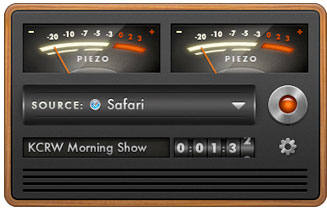
Piezo helps you record any audio on your Mac. Whether you want to record a Skype conversation, save a streaming radio program, or just record a quick voice memo, Piezo can do it. It runs on Mac OS X 10.6 and 10.7 and it can capture audio from any application (yup, even sandboxed App Store apps).
Download Piezo free, then buy it in the App Store or directly through our store.
June 9, 2012
Written by Shawn King
PandoDaily:
When HBO does come around to breaking free of cable, how late will it be? Clearly the ideal time to make this move is right this minute. Or, actually, it was two weeks ago, just before the Game of Thrones finale. In addition to the immense popularity of that nerd-bait show, HBO currently benefits from a struggling Netflix and Hulu, and a TV industry that hasn’t yet been completely remade by Apple, Amazon and Microsoft. If it had booked a few million non-cable subscribers now, and then slowly expanded on that effort over the next few years, the company could well have set itself up as a leading player in the new, many-device, multi-payment model TV world.But instead HBO is dithering, playing chicken with an unyielding future. How disastrous will this course prove? When HBO finally, inevitably decides to offer non-cable subscription plans, will it be just fashionably late, at a point where it can salvage its future? Or will it be so perilously tardy that it can’t catch up? At the moment, when it comes to streaming, the men who lead HBO seem bent on sticking with this second strategy—better never than late, as they see it.
Written by Shawn King
Apptentive:
We pinged Buzz Andersen (@buzz) for his thoughts on the topic. As a long-time WWDC attendee, former SF resident and established food and drink connoisseur we knew he’d have a great set of recommendations for us. We’re sad he won’t be making the trip this year but we’ll frequent a few of his favorite haunts in his honor.
If you are lucky enough to be attending WWDC, make time to explore one of the most beautiful cities in North America. It would be a shame to make the trip and not see at least some of the sites San Francisco has to offer. If you are a WWDC/San Francisco veteran, let us know your favorite spots and things to do in the comments.
Written by Shawn King
 The Verge:
The Verge:
We’ve already seen a number of renders of Apple Campus 2 — the company’s proposed “spaceship” campus — that show what it will look like from the outside. Of particular interest, though, is what’s going on beneath the surface — the campus will include a four level basement that features an auditorium and 4,300 parking spaces. The building has yet to be approved by the city, but if it does Apple is hoping to have it ready for some time in 2015.
June 8, 2012
Written by Shawn King
Bloomberg Businessweek:
Steve Jobs always oversaw Apple’s blockbuster product launches, but he was never a one-man show. Phil Schiller, the company’s longtime senior vice president of product marketing, often hammed it up onstage as the lower-brow counterweight to Apple’s cool, polished chief executive officer.Offstage, Schiller wasn’t a clown but one of Jobs’s most trusted, influential lieutenants. He helped Apple’s late CEO work through the meat-and-potatoes of creating new products: Defining target markets, determining technical specs, setting prices. It was Schiller who came up with the spin-wheel interface on the original iPod, and he was a champion of the iPad when other executives questioned its potential.Since Jobs’s death in October, perhaps no Apple executive other than CEO Tim Cook is under more pressure to fill the void.
Schiller may play the clown onstage but everyone who knows him knows he’s a pitbull when it comes to Apple.
Written by Jim Dalrymple
Thanks to Meechu for sponsoring this week’s RSS feed on The Loop.
Headed to WWDC next week? Leave your business cards at home for shimming tables. Take Meechu with you on your iPhone and connect to all the cool people you meet quickly and easily.
When you meet someone, open Meechu and tap the broadcast button. Anyone else running Meechu will automatically exchange information with you. There’s no ceremony, no extra services to sign up for. It’s quick, easy and simple.
Meechu is on sale for $1.99 in the App Store through the end of WWDC.








